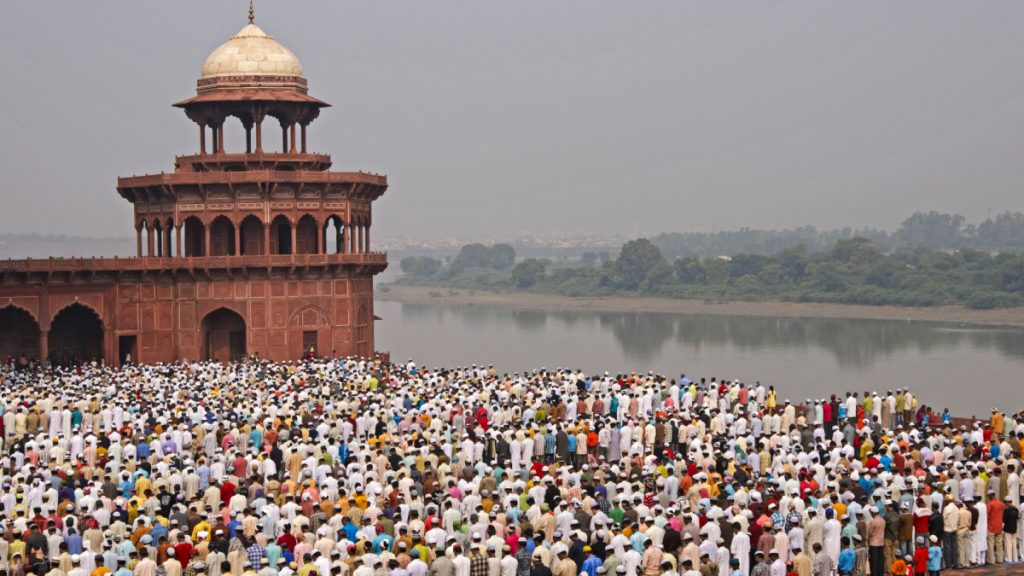Jamat-Ul-Vida, which translates to “Friday of Farewell,” is observed on the last Friday of the holy month of Ramadan. This day holds special significance for Muslims in India as they come together in mosques for congregational prayers, seeking forgiveness, blessings, and peace as they prepare for the end of Ramadan and the celebration of Eid-ul-Fitr.
Jamat-Ul-Vida is a time of spiritual reflection, gratitude, and acts of charity, as Muslims intensify their worship and devotion during the final days of Ramadan.
Table of Contents
Jamat-Ul-Vida Dates in India for 2024, 2025, and 2026
Here are the dates for Jamat-Ul-Vida in India for the upcoming years:
The Significance of Jamat-Ul-Vida in India
Jamat-Ul-Vida holds deep religious importance for Muslims in India and around the world. As the last Friday of Ramadan, it is a day dedicated to prayer, reflection, and seeking forgiveness from Allah. The day is often seen as a culmination of the spiritual efforts made during Ramadan, where Muslims reflect on their fasting, prayers, and charitable deeds, asking for divine mercy and blessings for the days to come.
Many Muslims believe that the prayers offered on Jamat-Ul-Vida are particularly powerful and can bring immense blessings. It is also a time to pray for global peace, unity among Muslims, and the welfare of humanity.
How Jamat-Ul-Vida is Celebrated in India
Jamat-Ul-Vida is observed with a sense of solemnity and devotion across India. Muslims gather in mosques for special prayers, sermons, and acts of charity, reflecting on the spiritual journey of Ramadan and preparing for the joyous celebration of Eid-ul-Fitr.
- Special Congregational Prayers: On Jamat-Ul-Vida, Muslims gather in large numbers at mosques for special congregational prayers known as Jumu’ah prayers. The Friday sermon (khutbah) delivered on this day focuses on the importance of maintaining the spiritual discipline achieved during Ramadan and continuing the good deeds beyond the holy month.
- Seeking Forgiveness and Blessings: Jamat-Ul-Vida is a time for Muslims to seek forgiveness for their sins and pray for peace, prosperity, and good health. It is believed that prayers offered on this day are accepted with greater favour, making it a significant day for worship and supplication.
- Charitable Acts: In keeping with the spirit of Ramadan, Jamat-Ul-Vida is a day for giving to the less fortunate. Many Muslims choose this day to give their zakat (obligatory charity) or sadaqah (voluntary charity), ensuring that those in need can also enjoy the blessings of Eid.
- Spiritual Reflection: The day is also a time for introspection and spiritual reflection. Muslims take the opportunity to evaluate their actions during Ramadan, striving to carry forward the lessons of patience, self-discipline, and compassion into the rest of the year.
Jamat-Ul-Vida in Different Parts of India
Jamat-Ul-Vida is observed with reverence across various regions of India, particularly in areas with significant Muslim populations. The day is marked by prayers, gatherings, and community activities that reflect the importance of faith and unity.
- Jama Masjid (Delhi): In Delhi, Jamat-Ul-Vida is celebrated on a grand scale at the historic Jama Masjid, where thousands of worshippers gather for the Friday prayers. The mosque, one of the largest in India, becomes a hub of spiritual activity as people come together to pray and seek blessings.
- Hyderabad: In Hyderabad, Jamat-Ul-Vida is observed with special prayers in mosques across the city. The historic Mecca Masjid sees a large turnout of worshippers who gather for the Jumu’ah prayers and listen to sermons emphasising the values of compassion, unity, and devotion.
- Lucknow: In Lucknow, the day is marked by prayers at the city’s mosques, including the famous Asafi Imambara and the Bara Imambara. Devotees come together to offer prayers, reflecting on the spiritual significance of the day and seeking divine blessings.
- Mumbai: In Mumbai, Jamat-Ul-Vida is observed with prayers at mosques throughout the city. The Haji Ali Dargah, a prominent religious site, attracts many worshippers who come to offer prayers and seek peace and blessings.
Jamat-Ul-Vida – A Day of Reflection, Prayer, and Charity
Jamat-Ul-Vida serves as a spiritual climax to the holy month of Ramadan, offering Muslims a final opportunity to intensify their prayers, seek forgiveness, and engage in charitable acts before the month concludes. The day is filled with a sense of unity and devotion as Muslims across India come together to reflect on the importance of faith, compassion, and community.
As Jamat-Ul-Vida marks the end of Ramadan, it is also a reminder of the values of self-discipline, patience, and kindness that the holy month instills in believers. The day encourages Muslims to carry these virtues into their daily lives, striving to maintain the spiritual growth achieved during Ramadan.
More Information about Jamat-Ul-Vida in India
Is Jamat-Ul-Vida a public holiday in India?
Jamat-Ul-Vida is a restricted public holiday in many states across India, particularly in regions with significant Muslim populations. Schools, government offices, and businesses may observe a partial or full holiday on this day.
How is Jamat-Ul-Vida observed in India?
Jamat-Ul-Vida is observed with special congregational prayers, sermons, and charitable acts. Muslims gather in mosques to offer Jumu’ah prayers and seek blessings as they prepare for the conclusion of Ramadan and the celebration of Eid-ul-Fitr.
What is the significance of Jamat-Ul-Vida for Muslims in India?
Jamat-Ul-Vida is a day of spiritual reflection, forgiveness, and charity. It is believed that prayers offered on this day carry special significance, making it a time for Muslims to seek blessings and prepare for the joyous occasion of Eid.
Why is Jamat-Ul-Vida important during Ramadan in India?
Jamat-Ul-Vida is important as it marks the last Friday of Ramadan, offering a final opportunity for intense prayers and reflection. It is a day to strengthen one’s connection with Allah and to ensure that the lessons of Ramadan continue throughout the year.

